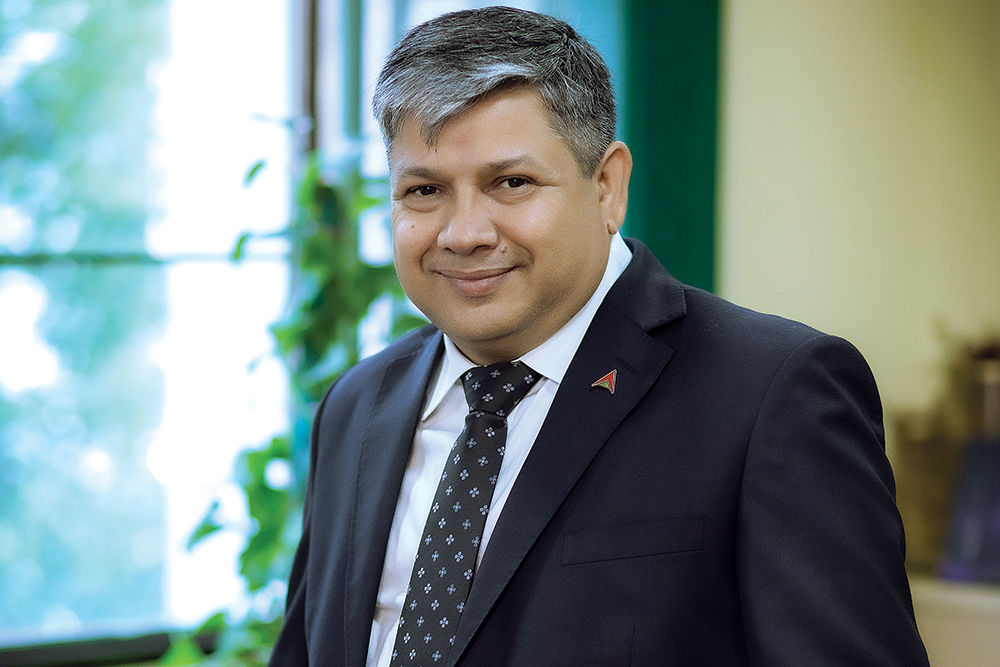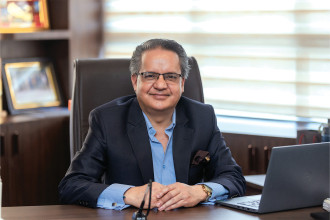
Krishna Subedi is a recognised name in the area of sales and marketing. He started his career in 1998 in the hospitality sector, then worked in FMCG, later transitioning to the banking sector starting with NMB Bank. He credits his association with international brands like Coca-Cola that helped him gain wider marketing knowledge and insight.
With over 25 years of solid marketing knowledge and experience, Subedi is currently Chief Marketing Officer of Nabil Bank.
In this issue of Business 360, Subedi speaks about various aspects of leadership. Excerpts:
What are your leadership engagement in Nabil Bank?
My experience spans various roles including Department In-charge, Department Head, and Department Chief in Nabil Bank. Initially, I managed four teams directly, but now I am into strategic and execution role in the capacity of CMO.
In my role, I am deeply involved in strategy formulation, focusing on market strategy, market expansion, market creation, brand setup, and brand perception building. I play a pivotal role in shaping the entire ecosystem of our business networking.
On the business side, I work extensively on business expansion, recognising that markets can be either homogenous or heterogeneous. This means that market demands and product needs vary significantly. My team and I conduct thorough research to identify market demands, allowing us to create and deliver products tailored to those specific needs, a process known as strategic expansion.
From a banking perspective, my involvement extends to overseeing the establishment of new branches. This requires comprehensive research and analysis, including visibility studies, demographic studies, and data analysis on population size, economic conditions, government budget allocations, and competitive landscapes. These studies help us determine the viability and sustainability of new branches.
In my current position, I lead both the execution and strategy formulation phases as Chief Marketing Officer. My team and I develop strategic plans which I then implement to ensure successful outcomes. My leadership in strategy and execution has been crucial to our market positioning and expansion efforts.
How do you define leadership?
For me, the most fundamental quality of a leader is acceptance among co-workers which develops through a clear and accurate vision. Leadership is not an overnight achievement; it requires sustained effort and dedication. A true leader must possess in-depth knowledge of their surroundings, the dynamics of team management, and technical expertise. This comprehensive understanding builds the foundation of trust within the team.
One critical aspect of leadership is the ability to solve problems. If a co-worker encounters an issue and seeks your help, your ability to resolve it will determine their trust and support.
Leaders often fail when they cannot identify and address problems effectively. A leader must analyse reports or data, identify the underlying problems, and offer a precise solution, which requires technical skills. In my role, my technical expertise allows me to analyse and address underlying issues effectively.
To achieve this level of expertise, a leader must have substantial knowledge, education and experience. It often takes years of experience in different positions to develop the technical skills required for effective leadership.
Thus, true leadership is a blend of vision, technical proficiency, problem-solving ability, and the capacity to inspire trust and confidence within a team.
Is leadership inborn or acquired?
I believe that leadership can be both inborn and acquired. Some individuals have innate leadership qualities while others develop these skills over time with their experiences. We can observe different types of leaders around the world; some are born to lead while others acquire the necessary knowledge and skills to pave their own path to leadership.
Everyone is born with the potential to be leader, but the development of this potential depends on various factors, including family background, culture, peer influences, personal interests, experiences, and lifelong learning. Our educational journey, spanning at least 20 years, plays a crucial role in shaping our leadership abilities. The quality of our academic experiences, the friendships we form, and the interests we pursue all contribute to our development as leaders.
Leadership can also be cultivated through observation and experience. We often learn by seeing, listening, exploring and even emulating others. Imitating someone isn’t inherently bad if it helps you improve and develop your own abilities. This experience not only affirmed my leadership skills but also reinforced my belief in the power of dedication and strategic planning.
When should a leader pass on the baton?
A leader should pass on the baton when they have adequately prepared their team to continue the mission and drive the organisation forward with confidence and competence. This preparation involves not just imparting knowledge, but also cultivating leadership qualities, strategic thinking, and a deep understanding of the organisation’s vision and mission.
My role encompasses vision setting, mission alignment, strategic formulation and education. Simultaneously, it is crucial to groom my team to eventually lead. Not everyone possesses innate leadership qualities or capacity which is why this pyramid structure exists. If leadership were universal, the hierarchy would not be so defined. Therefore, I dedicate 80% of my efforts to developing the people under me. As the Chief Marketing Officer, one of my core responsibilities is ensuring continuity in leadership. My focus is on creating a robust policy framework so that the next leader can build upon the foundation I have laid.
Succession planning is not an afterthought; it is an integral part of my daily responsibilities. I operate with three succession plans in mind to ensure there is always a ready and capable successor.
In conclusion, effective leadership involves not only steering the current direction of the organisation but also ensuring that there is a seamless transition when it’s time to pass the baton. By investing in my team’s development and creating a sustainable leadership pipeline, I am confident that the organisation will continue to thrive even in my absence. This proactive approach ensures that the vision and mission of the organisation endure, supported by leaders who are prepared to take on the challenges of the future.
How can one win over and influence people?
To win over and influence people, the most impactful approach is to offer genuine support and assistance when they encounter challenges. It’s easy to be friendly and agreeable, but true leadership shines through when you step up to help others tackle their problems, especially when they can’t handle those issues on their own. In today’s world, having an education is common, but what sets individuals apart is their unique skill set. By leveraging my skills to support others, rather than relying solely on physical abilities, I can foster a sense of acceptance and trust.
When people observe someone who consistently demonstrates acceptance, offers help, and supports those around them, they naturally view that person as a leader or role model. Empowering and trusting your colleagues is also crucial in this process, and I always strive to give my 100% to implement this principle. Additionally, effective communication, active listening, and showing genuine empathy are essential skills that contribute to winning over and influencing others. By combining these qualities and consistently demonstrating them, one can establish a strong and influential presence among peers and colleagues.
-1719723984.jpg)
How can a leader prepare for the unknown?
Preparing for the unknown is a critical skill for any leader, especially in roles related to Business Continuity Plan (BCP). Uncertainty is an inherent part of life and business, and it’s essential to have strategies in place to navigate unexpected challenges. Just as in life, where unforeseen events can occur at any moment, businesses must be ready to handle disruptions that could impact operations.
In my role, where I work closely with BCP, I understand the importance of being prepared for any eventuality. Effective business ethics dictate that we must have robust plans to manage our departments during crises. A comprehensive BCP is vital because it provides a structured approach to maintain operations even if critical staff members are unavailable.
BCP helps ensure resilience by outlining procedures and strategies to sustain essential functions, even in the event of a significant disruption. For instance, if the top three layers of key personnel are suddenly incapacitated, a well-developed BCP ensures that the organisation can still function smoothly. This involves detailed planning, regular drills, and continuous updates to the plan to address new potential threats.
In addition to having a solid BCP, leaders should foster a culture of adaptability and continuous learning within their teams. Encouraging innovation, staying informed about industry trends, and being proactive in risk management are essential components of preparing for the unknown. By combining these approaches, leaders can build resilient organisations capable of thriving even in the face of uncertainty.
What leadership style do you follow?
In today’s rapidly evolving landscape, the concept of leadership has expanded far beyond traditional frameworks. Leadership styles like laissez-faire, democratic, and autocratic are well-known, but contemporary leadership demands more nuanced approaches. Given the diverse workforce we manage differing in education, technical skills, age and abilities it’s clear that a one-size-fits-all leadership style is ineffective.
Personally, I adopt a situational leadership approach. This means I tailor my leadership style based on the specific context and the needs of my team. For example, when working with highly skilled and self-motivated individuals, I might lean towards a more laissez-faire approach, providing them with the autonomy they need to excel. Conversely, in situations that require quick decision-making or when working with less experienced team members, a more autocratic style might be necessary to provide clear direction and maintain focus.
Moreover, I believe in the power of reverse mentoring. This involves junior employees mentoring senior staff, fostering a two-way exchange of knowledge. This practice not only empowers younger employees but also keeps the organisation dynamic and adaptable to new trends and technologies.
Altogether, my leadership style is a blend of various approaches, adapted to the situation at hand. By being flexible, valuing input from all levels of the organisation, and fostering continuous learning, I aim to lead in a way that is both effective and inspiring.
Is there an ideal leader that you look up to and why?
When it comes to ideal leaders, I believe the concept evolves with time and circumstances, making it difficult to pinpoint just one. Different leaders excel in various domains, such as economics, mathematics, or technology, and each offers unique insights and inspiration.
In today’s world, motivational leaders dominate the scene, but as someone deeply involved in education and implementation, I tend to be inspired more by doers and their stories rather than just speakers. This means I don’t stick to one particular figure as an ideal leader. Instead, I draw motivation from various leaders across the globe who have made significant contributions in their respective fields.
Top leaders often provide solutions or motivation on a macro level. While their insights are valuable, they might not always be directly applicable to specific situations we face. Therefore, following their path blindly might not lead to personal growth or success. I believe it is crucial to have the ability to customise advice and create a unique path tailored to one’s circumstances.
To truly succeed, one must develop a distinct identity and approach. By integrating lessons from various leaders and adapting them to our specific context, we can carve out our own path and make a meaningful impact.
How important is a team for a leader?
The importance of a team for a leader cannot be overstated. Simply put, no one can perform effectively without a team. Anyone who believes they can succeed without one is fundamentally misunderstanding the nature of leadership and management. A team is indispensable for achieving any significant goals.
A leader relies on various resources, and one of the most crucial resources is their team. Effective leaders maximise the potential of whatever resources they have at their disposal, whether locally or domestically. When starting in a new place, a good leader doesn’t necessarily need to bring their old team along; instead, they have the capability to build the best team from the available talent in that new setting. This adaptability is a key trait of successful leaders.
I take pride in creating and developing a new team in each setting. I focus on grooming my team members, preparing them to handle any situation and eventually take over my position. This approach not only ensures continuity and sustainability but also empowers team members and fosters growth within the organization.






-(1)-1752214965.jpg)